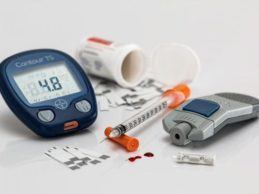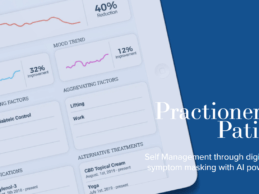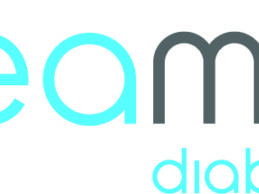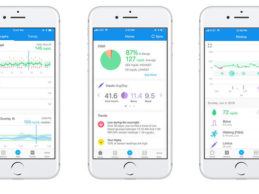What You Should Know:
- DreaMed Diabetes, the developer of personalized, AI-based diabetes management solutions, will participate in a clinical study, led by Jaeb Center for Health Research Foundation, to evaluate the efficacy of virtual treatment for diabetes patients. The research is funded by a grant from The Leona M. and Harry B. Helmsley Charitable Trust.
- DreaMed uses AI-powered technology to seamlessly treat
patients remotely with its virtual diabetes management service by
Read More
insulin
5 Reasons Why Providers Need Electronic Support for Glycemic Management
It’s no secret hyperglycemia and hypoglycemia are associated with adverse outcomes in hospitalized patients. We’ve known for many years that hyperglycemia is widespread in the hospital, causes immune dysfunction, higher rates of infection, a longer length of hospital stay, complications, and even death.
Insulin has been the most effective therapy for hyperglycemia since it was first created almost 100 years ago, but it can also be dangerous if not managed properly. In fact, nearly 50% of all
Read More
Big Data Takes on the Silent Epidemic of Undiagnosed Behavioral Health Conditions
Prior to the COVID-19 pandemic, a study found that almost half of Americans will experience an episode of mental illness in their lives, but may never get the diagnosis and treatment they need. In a more recent finding, over 25% of American adults now meet the criteria for a diagnosis of severe mental distress.
The looming impact on our collective mental health is concerning enough, but there are also serious implications for physical health. Left unaddressed, behavioral health issues
Read More
Welldoc Awarded 8th FDA Clearance for Bluestar Medical Device for Diabetes
What You Should Know:
Marks 8th FDA clearance for BlueStar, the only
reimbursable software as a medical device for diabetes that integrates with all
of a patient's existing devices.
Welldoc, revolutionizing digital health with the first FDA-cleared Software as a Medical Device (SaMD) for diabetes, announced today that the U.S. Food and Drug Administration (FDA) has cleared an additional feature for the digital health product BlueStar Rx which supports individuals using long-acting
Read More
Non-Invasive Technology for Measuring & Monitoring Liver Fat
As part of the growing awareness about chronic disease, it’s important to understand the relationship between nonalcoholic fatty liver disease (NAFLD), an asymptomatic condition characterized by elevated levels of fat in the liver, and diabetes. As a common complication of Type 2 diabetes and obesity, NAFLD can be overlooked comorbidity.
Diabetes is one of the leading causes of disability and death in the United States. One in 10 Americans have diabetes – more than 30 million people – and
Read More
The DNA Company Acquires AI Digital Therapeutics App for $30M to Form My Next Health
What You Should Know:
- DNA Company acquires AI-based digital therapeutics app My Pain Sensei (MPS) to form My Next Health and is building a COVID-19 risk assessment platform to help people understand their risks of developing serious COVID-19 complications.
- The acquisition combines functional genomics with conversational AI for patient self-management apps and disease tracking tools designed to inform clinician-patient interactions.
Leading functional genomics provider The
Read More
DreaMed Launches Virtual Diabetes Clinic to Help Type-1 Diabetics Control Their Condition in Quarantine
What You Should Know:
- As COVID-19 spreads, DreaMed Diabetes unveils virtual diabetes clinic software to treat people with type 1 diabetes remotely.
- The virtual clinic utilizes Dreamed Diabetes’ AI-powered solution, to improve the insulin management treatment by analyzing the patient’s insulin and glucose data in the platform's algorithm and to remotely advise doctors on treatment.
- According to the CDC people with chronic medical conditions, including diabetes, have a higher risk
Read More
6 Benefits of Telemedicine in Managing the Diabetes Epidemic
The American Diabetes Association reveals that 9.4% of the American population has diabetes, and with numbers that high nearly all Americans have a friend or family member with the disease. However, many Americans are not aware that telehealth can enable diabetic patients to manage their condition—treatment that would have otherwise been difficult to come by for rural patients with limited access to care.
With such a high prevalence among the population, providing care regardless of proximity
Read More
COVID-19: Glooko Offers Free Remote Care to Medical Clinics and People with Diabetes
What You Should Know:
- Glooko today announced that during the COVID-19 pandemic they are taking action to serve the global diabetes community by providing a no-charge remote care solution that provides live patient-to-clinician connectivity.
- To minimize the risk to people with diabetes during this time by broadening access to a remote medical appointment with healthcare providers, Glooko is offering its secure, privacy-protected remote care solution at no charge to medical clinics and
Read More
Do We Know When Medical Devices Fail?
Since 2015, the FDA and the US Department of Homeland Security have been releasing warnings about products that due to their vulnerabilities threaten patient safety. This includes MRI machines and drug infusion pumps that supply patients with a wide diversity of drugs, including insulin, antibiotics, chemotherapy drugs, and pain relievers. The interconnectivity of smart devices with medical clinical systems leaves them vulnerable to security breaches just like any other networked computing
Read More










